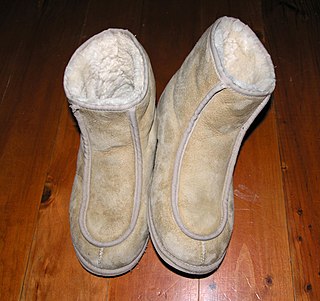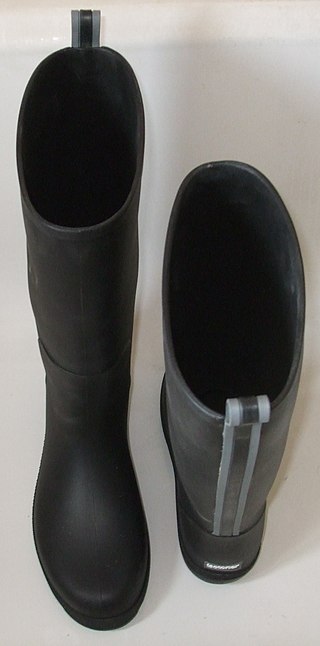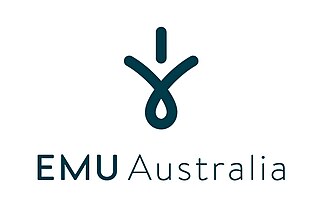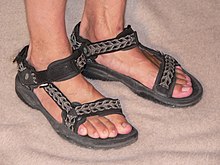
Ugg boots are a unisex style of sheepskin boot originating in Australia. The boots are typically made of twin-faced sheepskin with fleece on the inside, a tanned outer surface and a synthetic sole. The term "ugg boots" originated in Australia, initially for utilitarian footwear worn for warmth, and which were often worn by surfers during the 1960s. In the 1970s, the boots were introduced to the surf culture of the United Kingdom and the United States. Sheepskin boots became a fashion trend in the U.S. in the late 1990s and a worldwide trend in the mid-2000s. In Australia, they are worn predominantly as slippers and often associated with daggy fashion sense and bogan culture.

Timberland LLC is an American manufacturer and retailer of outdoor footwear and apparel owned by VF Corporation. The company also sells accessories including watches, eyewear, and leather goods. Timberland's corporate headquarters are located in Stratham, New Hampshire.

Totes Isotoner Corporation, stylized totes»ISOTONER and often abbreviated to Totes, is an international umbrella, footwear, and cold weather accessory supplier, headquartered in Cincinnati, Ohio, USA. Totes is regularly billed in press reports as "the world's largest marketer of umbrellas". The company has divisions in the United States, Canada, UK, and France.
Koolaburra is an American importer of sheepskin footwear founded in 1991. They are based in Santa Barbara, California. Koolaburra boots and shoes are currently made in Vietnam, and in the past have been made in Australia, Spain, Portugal, and China.
Warmbat was a USA-based footwear manufacturer that made Australian sheepskin boots, fashion sneakers, work boots and fashionable footwear. This brand was first introduced in Perth, Western Australia in 1969 making it one of the oldest manufacturers of sheepskin boots. The company had offices in Dayton, Ohio as well as Perth.

Sheepskin boots are boots made from sheepskin. The wool on sheepskin has good insulating properties and so such boots are commonly worn when it is cold.

UGG is an American fashion company primarily known for its sheepskin boots, founded in 1978 by Australian surfer Brian Smith in Santa Monica, California. After putting on his pair of Australian sheepskin boots after a chilly late-night surf in Malibu, Smith realized sheepskin boots weren't available in the United States like they were in Australia, giving Smith the idea to create UGG. UGG specializes in footwear, ready-to-wear, accessories, and home textiles.

Uggs-N-Rugs is a small business in Perth, Western Australia, manufacturing and retailing ugg boots. In 2006 Uggs-N-Rugs successfully challenged the registration of ugg/ug/ugh as a trade mark in Australia and continues to challenge the trademark registration through the Australian Sheepskin Association.
Douglas B. Otto is a business executive who co-founded Deckers Outdoor Corporation whose portfolio includes the UGG Australia brand.
Schuh is a Scottish footwear retailer based in Livingston, Scotland. It has 132 stores in the United Kingdom and Ireland. The company is predominantly a branded shoe stockist, selling over 80 brands, including: Converse, Vans, UGG, Nike, Adidas as well as its own Schuh label.
Rocky Brands, Inc., formerly known as Rocky Shoes & Boots, Inc., designs, develops, manufactures and markets outdoor, work, western and military footwear, and other outdoor and work apparel and accessories. The company was founded in 1932 in Nelsonville, Ohio and still maintains its corporate headquarters there.
Takken's Shoes is an independent shoe retailer with 2 stores in California (USA) and two retail websites. Specializing in comfort and family footwear, Takken's Shoes is also one of the largest UGG Australia retailers in the world. The corporate headquarters are located in San Luis Obispo, CA where the first Takken's Shoes was opened in 1937 by Harry Takken as a shoe repair business.

EMU Australia is an Australian lifestyle brand that designs, produces and markets footwear and accessories. The brand is best known for their sheepskin and Merino wool products. Their signature products are sheepskin boots, which have been a popular fashion trend for young women since the 2000s. EMU products are also available for men and children.
Ugg boots trademark disputes are the disputes between some footwear manufacturers, as to whether "ugg" is a protected trademark, or a generic term and thus ineligible for trademark protection. In Australia and New Zealand, where "Ugg" is a generic term for the style of footwear, 702 registered trademarks include the term "Ugg" in various logos and designs. By contrast, UGG is a registered trademark of the California-based company Deckers Outdoor Corporation in over 130 countries worldwide, including the U.S., the European Union, and China.

G.H. Bass is an American footwear brand founded by George Henry Bass in 1876.
Hoka One One is a sportswear company that designs and markets running shoes. It was founded in 2009 in Annecy, France, and had been based in Richmond, California before it was acquired by Deckers Brands in 2013. Hoka first gained attention in the running industry by producing shoes with oversized outsoles, dubbed "maximalist" shoes, in contrast to the minimalist shoe trend that was gaining popularity at the time.

Bearpaw Holdings LLC is an American brand of footwear, apparel, and accessories.
Mou is a footwear company founded in 2002 in London by Shelley Tichborne.












